
COLLOQUIA GERMANICA
metrics 2024
Connecting Scholars Through Insightful Research
Introduction
COLLOQUIA GERMANICA, published by FRANCKE VERLAG, serves as a vital platform for the dissemination of scholarly research in the fields of linguistics, literature, and literary theory. With a rich history spanning from 2002 to 2017 and again from 2020 to 2024, this journal is indexed under ISSN 0010-1338 and is recognized within Q4 quartile rankings in both Linguistics and Language, and Literature and Literary Theory as of 2023. Although it operates primarily on a subscription basis, this journal endeavors to enhance academic discourse and promote innovative research that contributes to our understanding of Germanic languages and literature. Researchers and professionals can greatly benefit from the journal's content, given its position in Scopus with notable rankings and percentiles in various categories. COLLOQUIA GERMANICA invites submissions that offer fresh insights into the intricacies of language and literature, making it an essential read for academics and students alike.
Metrics 2024
 0.10
0.10 -
- 0.10
0.10 4
4Metrics History
Rank 2024
Scopus
JCI (Web Of Science)
Quartile History
Similar Journals

Jordan Journal of Modern Languages & Literature
Showcasing Excellence in Language and Literary ResearchJordan Journal of Modern Languages & Literature is a prestigious academic journal published by Yarmouk University, Deanship of Research & Graduate Studies. This journal serves as a vital platform for scholars and researchers in the fields of linguistics and literature, offering a well-rounded examination of modern languages and literary theory. With an impressive Q2 ranking in Linguistics and Language and a Q1 distinction in Literature and Literary Theory as of 2023, it consistently features high-quality research that contributes to the advancement of knowledge in these domains. The Scopus rankings further reflect its academic rigor, placing it in the 79th percentile for Literature and Literary Theory and maintaining significant influence in related fields, making it an essential resource for researchers, professionals, and students alike. Although it does not operate under an open-access model, the journal's commitment to publishing groundbreaking studies can significantly aid in the understanding and progression of modern linguistic and literary practices. The Jordan Journal of Modern Languages & Literature continues to be an influential voice in fostering scholarly dialogue and advancing research in the humanities.
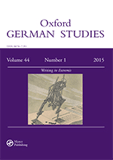
OXFORD GERMAN STUDIES
Bridging Historical Contexts with Contemporary InsightsOXFORD GERMAN STUDIES, published by Routledge Journals, Taylor & Francis Ltd, is an esteemed academic journal dedicated to the exploration and scholarly examination of German literature and linguistics. With an ISSN of 0078-7191 and E-ISSN of 1745-9214, this journal has been in circulation since 1966, offering researchers a unique platform for critical discourse, innovative research, and interdisciplinary dialogue. It holds a significant position in the academic landscape, being categorized in the Q4 quartile for Linguistics and Language and Q3 for Literature and Literary Theory as of 2023. Despite lacking open-access options, the journal thrives in providing invaluable insights, aiming to bridge historical contexts with contemporary perspectives on German studies. It serves as an essential resource for scholars, professionals, and students eager to deepen their understanding of Germanic languages and literature. Located in Abingdon, United Kingdom, the journal continues to uphold its mission of advancing knowledge and fostering scholarly discussions in the rich field of German studies.

Letteratura e Letterature
Fostering Critical Discourse in Literary Studies.Letteratura e Letterature is a distinguished scholarly journal dedicated to exploring the nuances of literature and linguistic theory, published by FABRIZIO SERRA EDITORE. This journal, identifiable by its ISSN 1971-906X and E-ISSN 1973-2600, serves as a significant platform for researchers, professionals, and students engaged in critical discourse within the fields of Literature and Linguistics. With a focus on fostering interdisciplinary dialogues, it seeks to illuminate diverse literary phenomena and linguistic intricacies, contributing meaningfully to the academic community. Despite being categorized in the Q4 and Q3 quartiles in 2023, the journal remains a vital resource, encouraging innovative scholarship and broadening the understanding of literary and linguistic interactions. Although it does not currently offer open access, the journal promises rigorous peer-reviewed content, ensuring the quality of published research. Operating from its base in Pisa, Italy, the journal continues to embrace its converged years from 2014 to 2021 and the ongoing 2023 to 2024 period as an era for refined scholarship and vibrant academic exchange.

Studia Theodisca
Navigating the Nexus of Culture and LiteratureStudia Theodisca is a distinguished academic journal published by Milano University Press that has been contributing to the fields of Cultural Studies and Literature and Literary Theory since its inception. With an ISSN of 1593-2478 and E-ISSN 2385-2917, this Open Access journal, available since 1994, ensures that research is freely accessible, fostering a global exchange of ideas. Located in Milan, Italy, the journal has gained traction within the academic community, reflected in its rankings: Q4 in Cultural Studies and Q3 in Literature and Literary Theory as of 2023. Despite its relatively new presence in Scopus, being placed in the ranks of 733 out of 1106 for Literature and Literary Theory and 1092 out of 1304 for Cultural Studies, it remains committed to advancing scholarly dialogue and exploring diverse narratives. Studia Theodisca serves as a vital platform for researchers, professionals, and students seeking to engage with innovative contributions and contemporary thought in these dynamic areas of study.
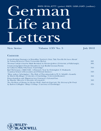
GERMAN LIFE AND LETTERS
Illuminating the Intersections of Literature and SocietyGERMAN LIFE AND LETTERS, published by WILEY, is a distinguished academic journal that has been a vital resource in the fields of Literature, Cultural Studies, and Sociology since its inception in 1936. With an impressive history spanning over eight decades, the journal is currently indexed with an E-ISSN of 1468-0483 and continues to serve as a critical platform for scholarly discourse and research across its converged years, encompassing materials from 1936 to 2024. Although classified in the Q4 and Q3 quartiles for various categories, its contributions significantly enrich our understanding of German literature and culture. Researchers, professionals, and students will find in this journal a captivating repository of insights, fostering a deeper appreciation for the interconnections between literature and socio-political themes. Unfortunately, it does not offer open access, but its wealth of knowledge and rigorous academic standards make it an essential read for those engaged in these disciplines.

Literary Voice
Transforming Literary Understanding Through ResearchLiterary Voice is a pioneering journal dedicated to the exploration and critique of literature and its multifaceted dimensions. Established in Punjab, India, and published by LITERARY VOICE, this journal aims to serve as a vital platform for scholars, researchers, and enthusiasts in the field of literary studies. With its ISSN 2277-4521 and E-ISSN 2583-8199, Literary Voice strives to foster intellectual discourse and encourage innovative scholarship through diverse thematic issues. While currently operating without an open access model, the journal provides a crucial space for the dissemination of original research and critical analysis that contribute to the enrichment of literary understanding. As an emerging publication in the humanities, Literary Voice invites submissions from across the globe, making it an essential resource for those looking to engage with contemporary literary debates and foster cross-cultural dialogues.
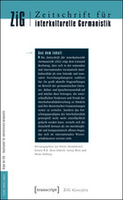
Zeitschrift fur Interkulturelle Germanistik
Examining Language as a Vehicle for Cultural UnderstandingZeitschrift für Interkulturelle Germanistik is a leading academic journal specializing in the field of intercultural studies and German linguistics. Published by TRANSCRIPT VERLAG, this journal serves as a platform for innovative research, critical essays, and interdisciplinary discussions that explore the complexities of cultural interactions within the German-speaking world and beyond. With a commitment to fostering scholarly exchange, the journal invites contributions that delve into themes such as language, identity, migration, and cultural dialogue. Although the journal does not currently offer open access, its robust editorial standards are aimed at providing readers with high-quality, peer-reviewed content. Researchers, professionals, and students engaged in German studies will find this journal an invaluable resource for the latest findings and theoretical advancements in intercultural communication and Germanistik. For more information, visit TRANSCRIPT VERLAG's official page.

ZEITSCHRIFT FUR DEUTSCHE PHILOLOGIE
Showcasing Innovative Research in German StudiesZEITSCHRIFT FUR DEUTSCHE PHILOLOGIE is a prestigious academic journal dedicated to the exploration of German philology, literature, and linguistic theory, published by Erich Schmidt Verlag. With a commitment to advancing scholarship in the field, it showcases a diverse range of research articles, critical essays, and theoretical explorations that contribute to the understanding of German language and its literary heritage. While the journal has experienced fluctuating coverage in indexing databases such as Scopus, it remains a valuable resource for researchers and students alike, offering insights into relevant academic discourse. Despite not being openly accessible, the journal continues to serve as an important platform for academic exchange and innovation, allowing scholars to engage with the complexities of language and literature. Its rigorous peer-review process ensures that only high-quality research is published, making it essential reading for anyone invested in the humanities.
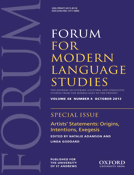
FORUM FOR MODERN LANGUAGE STUDIES
Illuminating the Landscape of Literary TheoryFORUM FOR MODERN LANGUAGE STUDIES is a prestigious academic journal published by Oxford University Press that has been serving the fields of literature and linguistics since its inception in 1965. This journal, with an ISSN of 0015-8518 and an E-ISSN of 1471-6860, plays a crucial role in advancing scholarly discourse on modern language studies, including literature and literary theory. With an impactful presence in both the linguistic and literary domains, it has been recognized in 2023 with a category ranking of Q2 in Literature and Literary Theory and Q3 in Linguistics and Language. It stands out in the competitive landscape, holding a notable position within Scopus rankings, including a 70th percentile ranking in Literature & Literary Theory. While the journal currently does not offer open access options, it remains a vital resource for researchers, educators, and students passionate about the transformative power of language and literature. Its commitment to quality research and robust academic discussion underscores its importance, making it a key platform for those aiming to contribute to modern language scholarship.
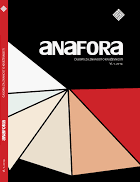
Anafora
Cultivating collaboration in the humanities for a brighter future.Anafora is an essential open-access journal published by the University of Osijek, Faculty of Humanities & Social Sciences, contributing to the dynamic fields of Communication, Cultural Studies, and Literature and Literary Theory. Since its inception in 2014, the journal has committed itself to disseminating innovative research and critical analysis, attracting a diverse array of scholars and practitioners from across the globe. Based in Croatia, Anafora's content is accessible to all, fostering inclusivity and collaboration within academia. While the journal currently holds a Q4 ranking in both Communication and Cultural Studies, and a Q3 in Literature and Literary Theory as of 2023, its growth trajectory indicates a promising future for the contributions it gathers. Researchers, students, and professionals alike are encouraged to engage with this platform to explore the multifaceted aspects of human expression and cultural discourse, thereby enriching the scholarly conversation within these pivotal domains.